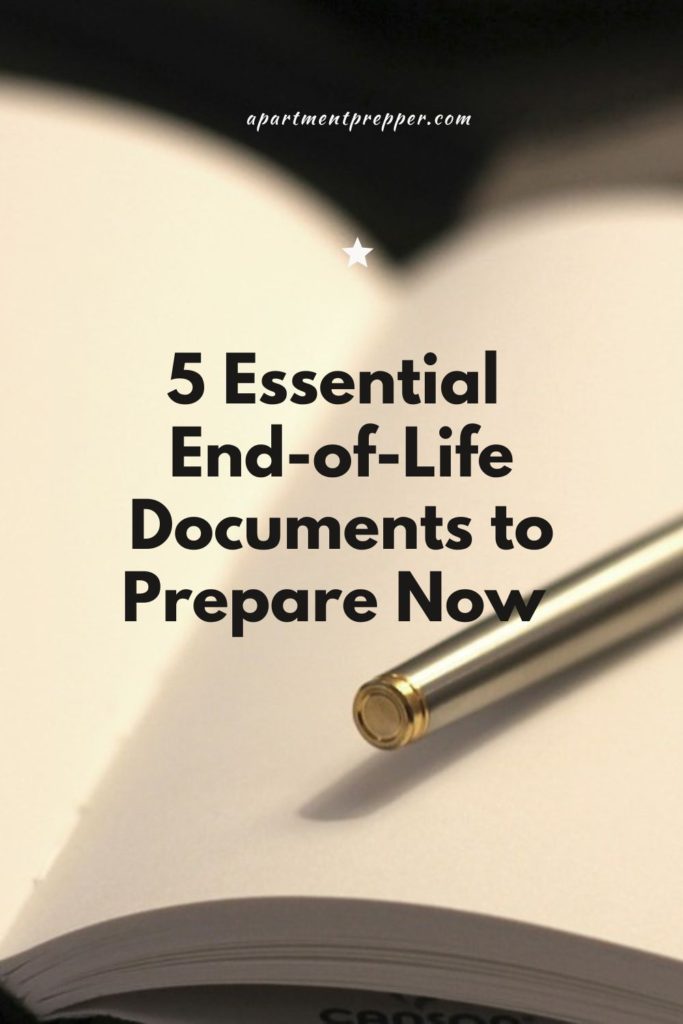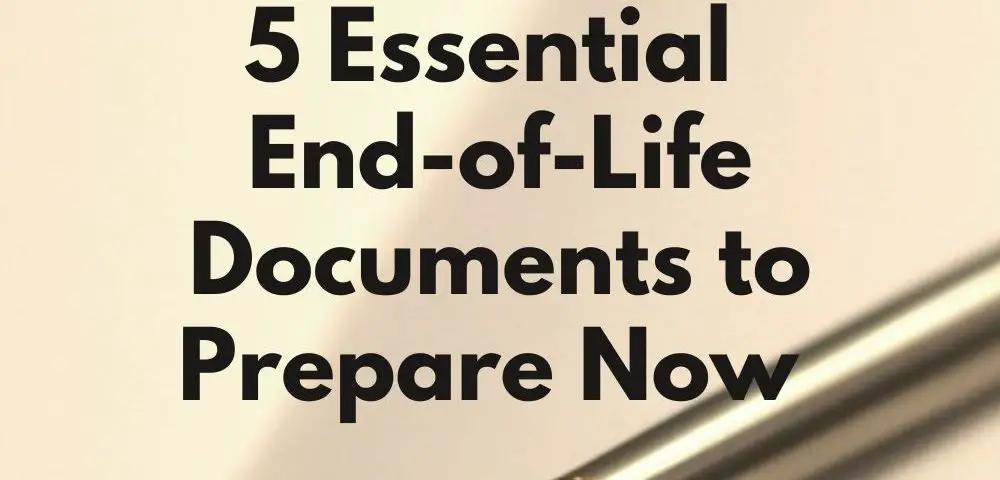Editor’s note: In today’s guest post, we discuss one type of emergency that many people would rather not think about: What would happen to your family if you suddenly become ill or pass away? This article will give you ideas on what important documents to prepare while you are able to make these decisions.
Written by Sarah Kessler
The primary concern when you’re prepping for any disaster is your own and your family’s safety and survival. But what if something did happen to you, and your family was left behind?
If you don’t have end-of-life documents prepared and put away safely, your family will be faced with a complex series of confusing tasks, all while grieving your loss or taking care of you while you undergo medical care. That’s why preparing end-of-life documents is a key factor in emergency preparedness.
Luckily, putting together these key end-of-life forms is a simpler process than ever before. Below, we’ll list each of the most important documents you should have prepared and tucked away in case of an emergency.
Living Will
A living will is also known as an advance directive. This important document allows you to decide what type of medical care and treatments you want to receive if you’re incapacitated.
This is important because if you’re injured in an emergency situation and have to go into surgery, your care team and your family already know your preferences.
An advance directive includes instructions regarding the use of CPR, nutrition/hydration, intubation, anesthesia, and other medical interventions. You can usually ask your hospital for an advance directive or living will, which they’ll keep on file. Be sure to ask for a copy for your own records.
Healthcare Proxy
Even if you have a living will or advance directive in place, you’ll want to document who you choose as your healthcare proxy. This is the person you want to make medical decisions for you if you’re unable to do so yourself.
This is important because situations can arise that aren’t covered by your advance directive, and you want someone you trust in charge of making those decisions.
Just like with an advance directive, your local hospital (the one where you’d go to seek treatment in an emergency) can help you designate a healthcare proxy in their system.
Life Insurance
Many people have life insurance already through their employers. However, if your family would be greatly affected financially without your income, you may want to enroll in additional coverage. And if you don’t have life insurance through an employer, it’s worth considering purchasing insurance privately.
Life insurance can not only replace your income if you pass away; some policies also cover permanent disability or incapacity.
When you enroll in life insurance, either privately or with your employer, make sure to get at least two copies of your policy for your records. If your policy changes, get copies of the updated version.
Power of Attorney
Your healthcare proxy and living will help protect your health and dictate medical treatment if you’re incapacitated. A power of attorney document is similar, but it covers financial decisions.
You can designate the person you trust most with your financial well-being to act as your power of attorney if you become unable to make financial decisions yourself.
Health Insurance Policy and Card
Typically, your hospital will have your health insurance on file. However, it’s still wise to keep a copy of your full health insurance policy on hand, including the health insurance company’s phone number and billing information.
Additionally, make a couple of copies of your insurance card to keep with your policy. That way, if someone needs to know your insurance number when you’re incapacitated, they can easily locate that information.
Last Will and Testament
Finally, it’s a great idea to have a last will and testament (also known simply as your will) in place, no matter how large your estate is. Consider the items that are most important to you, even if they have little or no financial value. Journals, photographs, and heirlooms are all items you can put in your last will and testament.
It’s a good idea to keep a copy of your will with someone you trust, such as a family member, as well as with an attorney’s office. Additionally, you should keep at least one copy of your will in your own belongings in case of emergency.
Protecting Your Key Documents
Preparing these essential documents is the first (and most difficult) step. The second step is to make sure that your documents are easily findable and protected from the elements. If there’s an emergency, you don’t want to spend hours searching for the important documents you need.
Keep all of your end-of-life documents in one place, along with other important documents such as your Social Security card and passport. Store these important items in a watertight container, and consider placing each one in a separate plastic ziplock bag.
Finally, let someone you trust know exactly where these key documents are. That way, if you’re not able to retrieve them, someone else might be able to.
About the author
Sarah Kessler is a writer at JoinCake.com, an end-of-life planning website with free resources and information on how to estate plan and honor loved ones’ final wishes.
If you found this article interesting or helpful, please consider helping us out (without costing you anything)! We are an affiliate of Amazon.com, which means we received a small commission if you click through one of our Amazon links when you shop, at totally no cost to you. This helps keep the lights on at the blog. Thanks!




Power of Attorney is also known as a General Durable Power of Attorney.
Healthcare Proxy is also known as a Medical Durable Power of Attorney.
Living Will is also known as Advanced Directive for Medical/Surgical Treatment.
Speaking from experience, you’d better have these in place or some bimbo in the hospital will take it upon themselves to make the decisions about your care, and they will label you as a DNR without consulting the family.
Hi Tom, That is good advice that everyone needs to pay attention to before a situation arises in the hospital. Thank you for the comment.